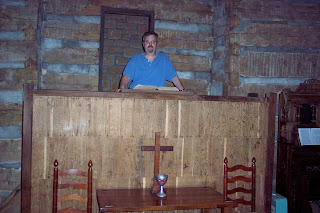Is Liturgical Order Important?
Picking up on what I posted yesterday, concerning whether the Disciples of Christ celebration of the eucharist is a system in crisis, I thought I'd share something about about liturgical order. There is no prescribed worship order for Disciples churches. Congregations can pretty much do anything they want, and they do. I'm of the view that the way we order worship speaks to how we understand worship. Whether we realize or not, it reflects a certain theology. For Disciples communion is a non-negotiable. We will have it, whether we do it well or not).
One of the key questions concerns where to place the sermon and the communion. The earliest description of a worship service comes from Justin Martyr in the mid-second century. He places the sharing of the word prior to communing. Now, simply because it's ancient doesn't mean we have to follow the practice, but this order continually appears down through history until very recently.
Keith Watkins, whom I often quote in matters such as this (and I want to be a faithful interpreter of his words) suggests that when we talk about liturgical order this isn't merely a question of preferences. He suggests that where we place each element speaks to differing understandings of the church. He traces the dilemma we face back to Alexander Campbell himself.
Keith writes:
He taught Disciples two lessons about worship on the Lord's Day. The first was learned very well: that the breaking of the loaf is the distinctive purpose and major characteristic of the Lord's Day and therefore should be done every Sunday. The second lesson, as Campbell taught it, presents a more complicated story. The lesson was that social worship consists of several ordinances -- including the breaking of the loaf, teaching, prayers, and contributing to the relief of the saints -- all of which are to be part of the Sunday activities of Christians. For Campbell, it was important that all of the ordinances be observed each Sunday, but the order in which they were observed little. [Celebrate with Thanksgiving, p. 18]
Keith gives some important history about how the practices emerged, which merits consideration. Regarding our current situation, he notes that when communion is early, what we have is essentially a "service of the Word," and it's consistent with non-sacramental Protestantism. It's why many speak of the eucharist as an ordinance rather than a sacrament. However, when the communion follows the Word, worship is centered in the Table and is interpreted by the Word of God. So Keith writes:
This idea is consistent with the sacramental approach to worship that marks the catholic impulse in Christianity. It emphasizes God's self-disclosure in nature and history, asserting that salvation comes from participation in a community that embodies the divine Spirit. This participation is by means of sacramental eating and drinking with God. [Celebrate with Thanksgiving, p. 21].
The latter vision is the one that Keith embraces, and it's one that I would as well. Keith sent me note responding to yesterday's posting, reminding me that he is writing a theological memoir that will take up this question. Having read a much earlier draft, I look forward to its completion. The question before us then is this: are we a "Bible-centered church, colored by eucharistic piety?" Or, are we a "sacramental church, braced by the Word of God? [Celebrate with Thanksgiving, p. 21].

Comments
I look forward in the coming months to seeing the consequences of our congregation's examination of our understanding and experience of the table. I hope we can share as a larger group our reflections on the Gallagher book and the various classes we shared. It will be interesting to see how new insights are reflected in our practice and prayers.
I am hoping that Nora's book, plus the other work we do this year will enrich our worship and sense of mission, both of which center on the Table.